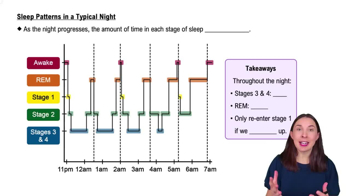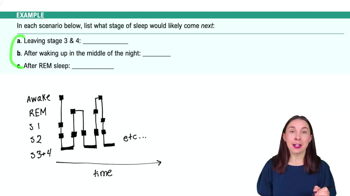Table of contents
- 1. Introduction to Psychology1h 43m
- 2. Psychology Research2h 20m
- 3. Biological Psychology2h 41m
- 4. Sensation and Perception28m
- 5. Consciousness and Sleep32m
- 6. Learning41m
- 7. Memory34m
- 8. Cognition37m
- 9. Emotion and Motivation35m
- 10. Developmental Psychology33m
- 11. Personality48m
- 12. Social Psychology41m
- 13. Stress and Health41m
- 14. Psychological Disorders44m
- 15. Treatment47m
5. Consciousness and Sleep
Sleep
Struggling with Psychology?
Join thousands of students who trust us to help them ace their exams!Watch the first videoMultiple Choice
If the brain-wave pattern of a person playing a professional game of chess was recorded using an electroencephalogram (EEG), what type of brain waves would most likely be detected?
A
Alpha
B
Delta
C
Theta
D
Beta
 Verified step by step guidance
Verified step by step guidance1
Understand the context: Playing a professional game of chess requires high levels of concentration, alertness, and cognitive processing.
Identify the function of each type of brain wave: Alpha waves are associated with relaxed, calm, and awake states. Delta waves are linked to deep sleep. Theta waves are related to light sleep and relaxation. Beta waves are associated with active thinking, problem-solving, and focus.
Match the brain wave type to the activity: Since playing chess involves active thinking and problem-solving, the brain wave type that corresponds to these activities is most likely to be detected.
Recognize that Beta waves are typically present during activities that require concentration and mental effort, such as playing chess.
Conclude that the brain-wave pattern most likely detected in a person playing a professional game of chess would be Beta waves, due to the high cognitive demands of the activity.

 3:25m
3:25mWatch next
Master Circadian Rhythms with a bite sized video explanation from Hannah Gordils
Start learningRelated Videos
Related Practice


































































































![Race, Genes and IQ Differences | Bret Weinstein [Mini Clip]](https://img.youtube.com/vi/IztL_m3pd70/mqdefault.jpg)



































































































